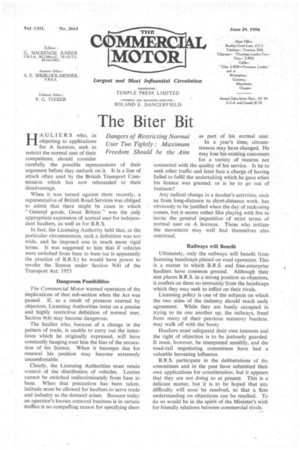The Biter Bit H AULIERS who, in objecting to applications for
Page 41

If you've noticed an error in this article please click here to report it so we can fix it.
A licences, seek to restrict the normal user of their competitors, should consider carefully the possible repercussions of their argument before they embark on it. It is a line of attack often used by the British Transport Commission which has now rebounded to their disadvantage.
When it was turned against them recently, a representative of British Road Services was obliged to admit that there might be cases in which "General goods, Great Britain" was the only appropriate expression of normal user for independent hauliers, as well as for B.R.S.
In fact, the Licensing Authority held that, in the particular circumstances, such a definition was too wide, and he imposed one in much more rigid terms. It was suggested to him that if vehicles were switched from base to base (as is apparently the practice of B.R.S.) he would have power to revoke the licence under Section 9(4) of the Transport Act. 1953 Dangerous Possibilities The Commercial Motor warned operators of the implications of that sub-section when the Act was passed. If, as a result of pressure exerted by objectors, Licensing Authorities insist on a precise and highly restrictive definition of normal user, Section 9(4) may become dangerous.
The haulier who, because of a change in the pattern of trade, is unable to carry out the intentions which he originally expressed, will have constantly hanging over him the fear of the revocation of his licence. When it becomes due for renewal his position may become extremely uncomfortable.
Clearly, the Licensing Authorities must retain aontrol of the distribution of vehicles. Lorries cannot be switched indiscriminately from base to base. When that precaution has been taken, latitude must be allowed for hauliers to serve trade and industry as the demand arises. Because today an operator's known outward business is in certain traffics is no compelling reason for specifying them as part of his normal user. In a year's time, circumstances may have changed. He may lose his existing customers for a variety of reasons not connected with the quality of his service. Is he to seek other traffic and later face a charge of having failed to fulfil the undertaking which he gave when his licence was granted, or is he to go out of business?
Any radical change in a haulier's activities, such as from long-distance to short-distance work, has obviously to be justified when the day of reckoning comes, but it seems rather like playing with fire to -invite the general imposition of strict terms of normal user on A licences. Those who initiate the movement may well find themselves also restricted.
Railways will Benefit Ultimately, only the railways will benefit from licensing handicaps placed on road operators. This is a matter in which B.R.S. and free-enterprise hauliers have common ground. Although their size places B.R.S. in a strong position as objectors, it confers on them no immunity from the handicaps which they may seek to inflict on their rivals.
Licensing policy is one of the subjects on which the two sides of the industry should reach early agreement. While they are busily occupied in trying to tie one another up. the railways, freed from many of their previous statutory burdens. may walk off with the booty Hauliers must safeguard their own interests and the right of objection is to be jealously guarded It must, however, be interpreted sensibly, and the road-rail negotiating committees have had a valuable leavening influence.
B.R.S. participate in the deliberations of the committees and in the past have submitted their own applications for consideration, but it appears that they are not doing so at present. This is a delicate matter, but it is to be hoped that any difficulty will soon be resolved, so that a firm understanding on objections can be reached. To do so would be in the spirit of the Minister's wish for friendly relations between commercial rivals.
















































































































































